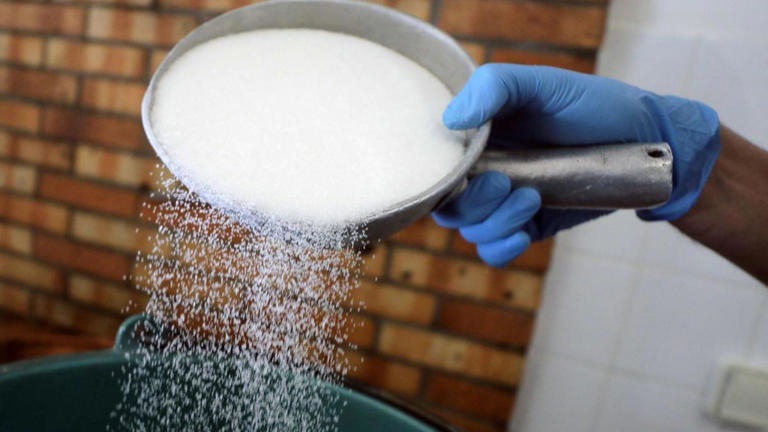Sugar shortage likely to repeat as festival season begins: Nepal

Nepal faces potential sugar shortages this festival season due to delays by government supply firms in importing the sweetener. Last year’s shortage saw prices surge from Rs90 to Rs160 per kg, with long queues at supply centers. Although the government approved importing 30,000 tonnes of sugar and waived 50% customs duty, delays in procurement and a lack of stock could lead to further shortages. Consumer rights activists accuse the government of intentional delays, fearing price hikes.
Nepal may face a sugar shortage in the upcoming festival season as the two government supply firms importing the household sweetener started off late.
Last year, Nepal faced a sugar shortage during the festive season, with the price jumping from Rs90 to Rs160 per kg. As sugar was not readily available in the market, consumers were forced to queue for long hours at Salt Trading and Food Management and Trading Corporation.
The corporation had imposed a quota system, allowing only two kgs at a time.
The Cabinet meeting on September 9 permitted the Salt Trading Corporation and the Food Management and Trading Company to import 30,000 tonnes of sugar—15,000 tonnes each. The meeting also decided to waive 50 percent customs duty.
“Importing sugar through global tender will cause a delay as the festive season nears,” said Sharmila Neupane Subedi, information officer at the Food Management and Trading Company.
“So we are working on another option: to bring sugar through a G2G, or government-to-government, arrangement, which will speed up the process.”
“If the G2G model does not work, then the possibility of importing sugar for Dashain, Tihar and Chhath is low,” Subedi said. These are the festivals when the demand for sugar rises exponentially. The supply firms have planned to import sugar in phases.
The quantity of sugar to be brought in the first phase through the G2G arrangement is yet to be decided. “Once a certain amount of sugar is imported in the first phase, the remaining quantity will be imported through competitive bidding.”
According to Subedi, the CEO of the Food Management and Trading Company had a first round of discussions with India’s National Cooperative Exports Limited about importing sugar through the G2G model.
Subedi said that despite the government providing a 50 percent customs duty waiver, the price would be determined based on the rate set by the Indian counterpart.
The retail price is Rs110 per kg in the market.
Subedi said that the company has no stock of sugar. For more than a year, the Food Management and Trading Company has not imported the commodity.
Kumar Rajbhandari, information officer at the Salt Trading Corporation, said his company opened the tender to import sugar two weeks ago.
“If we can find Indian suppliers, sugar may arrive before the festival. All our efforts are directed at bringing sugar on time. We are prepared to sign an agreement within seven days after the supplier is chosen.”
According to Rajbhandari, they started the preparation a long time ago but got the letter from the government late.
“We were prepared and opened the tender as soon as we received the nod,” said Rajbhandari.
This year, the Dashain begins on October 3. However, sugar is also consumed in high quantities in Tihar and Chhath when tonnes of sweet items are sold across the country.
Nepal consumes 275,000 tonnes of sugar annually, of which 150,000 tonnes are produced in the country while the rest is imported.
Consumer rights activists suspect the motive behind the delayed sugar procurement process.
“This year, too, the government delayed its decision—an intentional delay that occurs during the festivals every year,” said Prem Lal Maharjan, president of the National Consumer Forum.
“The sugar price will shoot up.”
Maharjan said the delay leaves ample room to suspect a collusion between powerful traders and the government. The delay favours private traders, who will artificially raise the price, he added.
The National Consumer Forum wrote a letter to the government on the issue three months ago.
Last year, on September 13, the finance ministry approved the import of 20,000 tonnes of sugar for the festive season. The Ministry of Industry, Commerce and Supplies had asked to import 60,000 tonnes to meet the anticipated demand.
The finance ministry’s delayed approval caused panic in the market, and on that pretext, sugar prices nearly doubled, according to consumer rights activists.
“When it comes to sugar imports, something fishy happens every year,” they said.
In October last year, India, the world’s biggest sugar producer after Brazil, banned mills from exporting sugar—in its first sugar export curb in seven years.
According to Reuters, India plans to extend a ban on sugar exports for the second straight year as the world’s biggest sweetener consumer grapples with the prospect of a lower sugarcane output.
According to the news agency, New Delhi plans to prohibit mills from exporting sugar when supplies from Brazil, the world’s top producer, are expected to drop because of a drought in the South American nation.
In November last year, when the country was facing a serious sugar crisis, India allowed Nepal to import 25,000 tonnes with immediate effect, valid until September this year.
However, with Indian suppliers quoting high prices, Nepal reached out to Pakistan for the sweetener—to no avail.
To read more about the news about the Sugar Industry continue reading Agriinsite.com
Source: https://kathmandupost.com/money/2024/09/16/sugar-shortage-likely-to-repeat-as-festival-season-begins

















